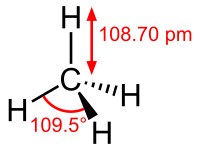
Photo from wikipedia
Abstract In this study, biological methanol production under repeated batch conditions by immobilized Methylocystis bryophila, using simulated biogas of methane (CH4) and carbon dioxide (CO2) as a feed is demonstrated… Click to show full abstract
Abstract In this study, biological methanol production under repeated batch conditions by immobilized Methylocystis bryophila, using simulated biogas of methane (CH4) and carbon dioxide (CO2) as a feed is demonstrated for the first time. The composition of the simulated gas mixtures significantly influenced methanol production by M. bryophila, and in all cases, higher concentrations were achieved than with pure CH4 alone. Under optimum conditions, maximum methanol concentrations of 4.88 mmol L−1, 7.47 mmol L−1, and 7.02 mmol L−1 were achieved using the gas mixtures CH4:CO2 (2:1 ratio), CH4:hydrogen [H2, (4:1 ratio)], and CH4:CO2:H2 (6:3:2 ratio), respectively, as feed, with a fixed CH4 concentration of 30%. Methanol yield was increased to 7.85 mmol L−1 using covalently immobilized cells and the simulated gas mixture CH4:CO2:H2 (6:3:2 ratio). Under repeated batch conditions, immobilized cells produced a significantly higher cumulative methanol concentration (25.75 mmol L−1) than free cells (15.50 mmol L−1), using a simulated biogas mixture of CH4:CO2 (2:1) and eight reuse cycles, suggesting that this mixture can potentially be utilized as a feed for the production of methanol. Furthermore, the effective utilization of low-cost feedstock, derived from natural sources, containing gas mixtures of CH4:CO2, CH4:H2, or CH4:CO2:H2, constitute an economical and environmentally friendly approach to the reduction of greenhouse gases.
Journal Title: Energy
Year Published: 2018
Link to full text (if available)
Share on Social Media: Sign Up to like & get
recommendations!